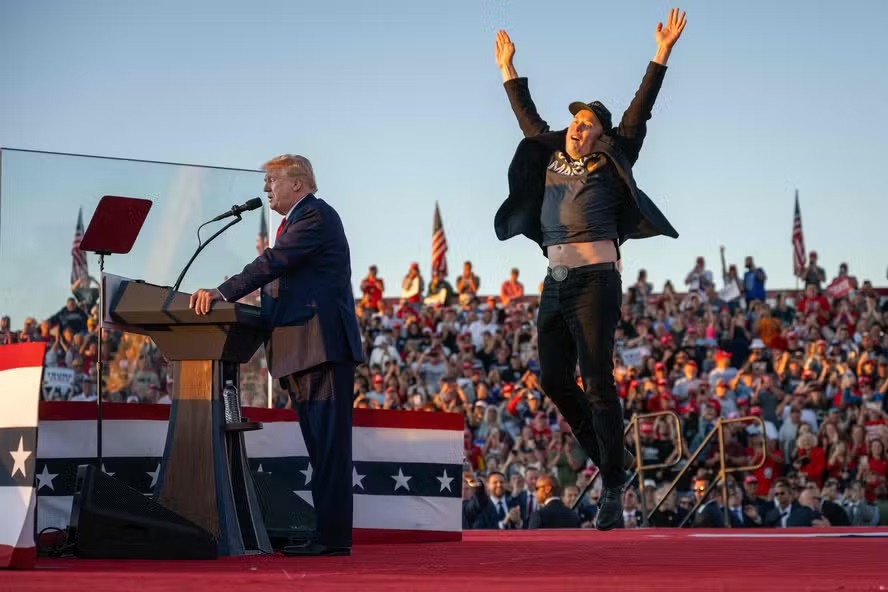
Published 13/11/2024 12:07 | Edited 11/13/2024 12:18
Billionaire Elon Musk was announced by the president-elect of the United States, Donald Trump, to assume a new portfolio linked to the White House. Musk will head the US Department of “Government Efficiency”. The appointment comes after the businessman poured 200 million dollars (R$1.15 billion) into the Republican’s campaign, purchasing direct access to the Oval Office for four years.
Musk will lead the department alongside fellow businessman Vivek Ramaswamy, who ran in the Republican Party primaries against Trump this year, but abandoned the electoral race at the beginning of the campaign. A billionaire in the biotechnology sector, Ramaswamy is the son of Indian immigrants and has taken a stand against any type of irregular immigration.
The Department of Government Efficiency is a body that will be created by Trump and will have the acronym DOGE, in likely reference to the Dogecoin cryptocurrency, supported by Musk on several occasions. “This will shock the system and anyone involved in waste within the government — that is, a lot of people!” said Musk.
Behind the announcement, however, there are the corporatist intentions of Musk and all kinds of billionaires who work or once worked in Silicon Valley, a region in California that is home to one of the world’s largest centers of technological innovation. In the Valley, giants such as Google, Apple and Meta and businesspeople aligned with Trump are headquartered, such as Peter Thiel, Marc Andreessen, Ben Horowitz, as well as others such as David Sacks and Chamath Palihapitiya.
The latter supported Trump’s campaign in 2024 due to policies to reduce regulations in the sector, which facilitates the business interests of Big Techs.
Conflict of Interest
On the surface of Trump’s decision to tap Musk and Ramaswamy to head the Department of “Government Efficiency”, Republicans seek to make clear to the American population what the apparent objective is: firing thousands of public employees and promising the government to manage the country as a company, in the old liberal style of streamlining the State to make it more efficient.
In the depths of this announcement, however, lie the conflicting interests between the state and the large private conglomerates in the USA.
In Musk’s case, some of his most profitable companies, such as SpaceX and Tesla, have billion-dollar contacts with the American government. So far, Musk has given no indication that he will give up control of his companies when he takes office.
Today, the six companies Musk runs are deeply intertwined with federal agencies. They make billions from contracts to launch rockets, build satellites and provide satellite communications services. Tesla, for example, earns hundreds of millions more from tradable emissions credits created by federal laws.
Musk’s companies also face at least 20 recent investigations, including one focused on self-driving car technology that Tesla considers critical to its future. Now, Musk gains the power to directly supervise them.
Tesla investigated by US state agency
As soon as Trump won, Musk rushed to declare on his social networks: “the future will be fantastic”. In addition to the supposed American patriotism of the South African-born businessman, the owner of Tesla, SpaceX and X (formerly Twitter), Musk can control agencies that regulate and investigate his companies.
Last Friday (8), the National Traffic Safety Administration (NHTSA) made public an email, dated May 14, in which the agency expressed concerns about a series of posts on social media. social media from Tesla, which suggested that its Full Self-Driving (FSD) software enables the use of vehicles as robotaxis, without the need for human interaction.
The company’s fully autonomous driving program, however, is being investigated by the United States road safety regulator after four accidents, one of them fatal, were reported related to the system.
The NHTSA opened the investigation after the system remained active after billionaire Elon Musk’s branded vehicles entered areas with reduced road visibility (sun glare, fog, dust) and ran over victims.
Tesla invested large sums in its autonomous driving program, but saw its system embroiled in controversy and under scrutiny from American authorities due to accidents.
In April, the company reached a settlement with the family of a driver who died when his Model X crashed in Silicon Valley in 2018 while using its Autopilot driving assistance software.
Last year, the company was forced to recall almost 363,000 cars equipped with FSD Beta technology and more than two million vehicles due to risks associated with Autopilot.
Under Musk’s administration, however, these problems are likely to dissipate.
Source: vermelho.org.br

